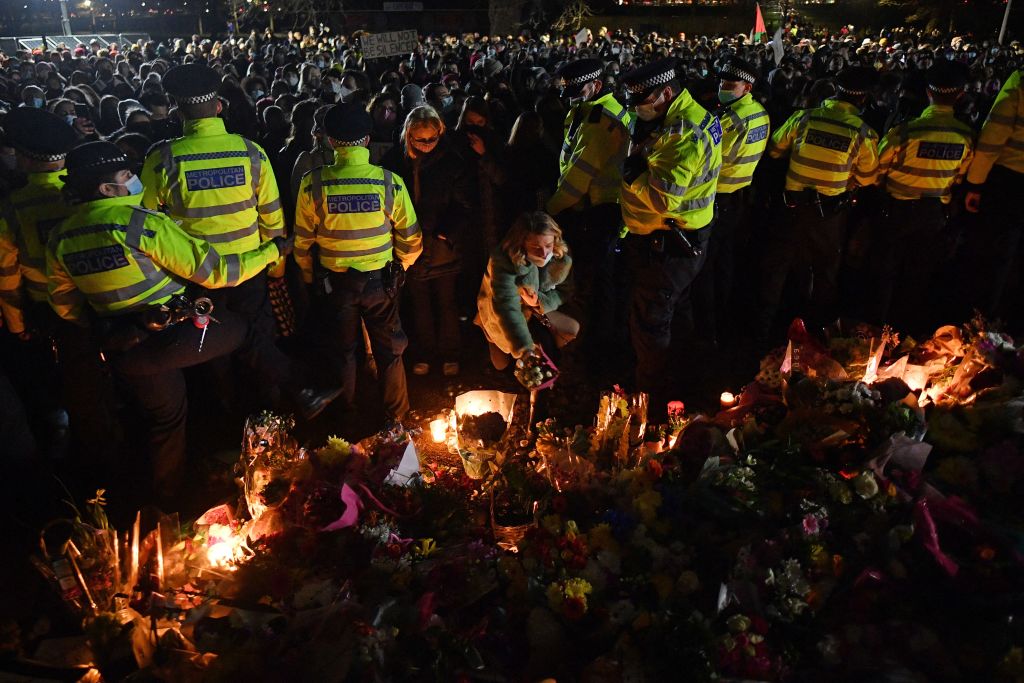Sarah Everard, a 33-year-old marketing executive living in Brixton, and a ‘wonderful daughter and sister’, was killed earlier this month. Last night, the women trying to remember Sarah at a vigil in Clapham Common were dragged and arrested by Metropolitan police officers. Not only did this show poor judgement, it was an unnecessary and careless use of force. Sarah Everard was just trying to walk home, the women out last night were just trying to mourn her.
The Met’s chief, Cressida Dick, said after Sarah Everard’s disappearance that ‘Every woman should feel safe to walk our streets without fear of harassment or violence.’ Yet on Saturday night, her officers disturbed a peaceful vigil, trampling the flowers left in memory of Sarah Everard.
The police decided to take extreme action against women who were paying their respects to a woman the police failed to protect. The Met claim they were trying to make the environment safe. Instead, women were being texted by their friends and family to make sure they were safe and not being manhandled by the police – the irony of the entire situation is almost off the scale. The images from last night’s vigil, of male police officers detaining women who simply want to be safe, will not be forgotten easily.
Most women, when they first heard of Sarah Everard’s disappearance, weren’t surprised at the steps she took to protect herself: wearing shoes she could run in, wearing bright clothing, walking on the main road, calling her partner. And yet it didn’t work, because she wasn’t the issue. Women are not the issue. And we weren’t surprised to see that women took every step to make sure that yesterday’s vigil was peaceful. The responsible group of organisers, a number of whom are local councillors, tried to liase with the council and the police to create a respectful and safe event, offering to provide time slots and Covid marshals. And yet it didn’t work, because they were not the issue. The police were.
Footage from the vigil showed a row of women being dragged away from the bandstand on the common, which has been filled with flowers for Ms Everard. One sign read: ‘We aren’t safe in our homes, how can we reclaim the streets?’ Members of the crowd could be heard shouting ‘shame on you’ and ‘you are scum’ at the police, while one woman screamed ‘you’re supposed to protect us’.
If the vigil had been allowed to go ahead as planned, there is a good chance it would have been a peaceful and Covid-safe event (most attending were wearing masks). As The Spectator’s leading article this week points out, hospital admissions have fallen by 80 per cent from the second wave’s peak, deaths are down 85 per cent and cases down 90 per cent. And yet the Met and the Home Secretary Priti Patel – who since the Black Lives Matter protests has wanted the police to appear tough on gatherings during the pandemic – did not allow the vigil to take place. This is despite Sir Patrick Vallance saying earlier this week that ‘It’s difficult to see how outdoor gatherings lead to spikes [in coronavirus cases]’. Women deserved a space to grieve and remember, catharsis was needed. All the vigil’s ban accomplished was heightening tensions and the sense of injustice in women’s treatment in this country.
On Monday the Commons will debate the Police, Crime, Sentencing and Courts Bill, which will give the police powers ‘to take a more proactive approach in managing highly disruptive protests causing serious disruption to the public’. The policing bill doesn’t mention women once, but it will cover statues. Even so, MPs should think carefully about this. As Isabel writes today, a rethink of the powers the state now holds over our freedom is much needed – and it will not be just the lockdown sceptics who are demanding this.
This isn’t now about firing Cressida Dick (although I do think she should resign), or the time for vague statements of solidarity from politicians, because this doesn’t really make women in this country any safer. We need a culture change. We need better town planning to make side streets lighter, and bus shelters safer. We need better prosecutions – rape prosecutions have dropped every year since 2016-17 and are now at a record low. Harassment is widespread – recent research showed that 97 per cent of women aged 18 to 24 have experienced sexual harassment in public spaces. We need men to help change this. Around half of the population have to think about escape tactics they might use while just going about their daily walk.
A statement from the Metropolitan Police Assistant Commissioner said of the Clapham Common confrontation: ‘We absolutely did not want to be in a position where enforcement action was necessary. But we were placed in this position because of the overriding need to protect people’s safety.’ Maybe they should focus on dealing with the threat that their own officers pose to women, instead of blaming women and speaking like an abuser. They might as well have said ‘Look what you made me do.’
Women have gone back to Clapham Common to tidy the flowers that were trampled by the police. Women will carry on wearing bright clothes and walking on main roads, just like Sarah Everard did. It is not they who need to change.





Comments